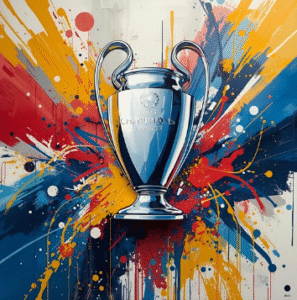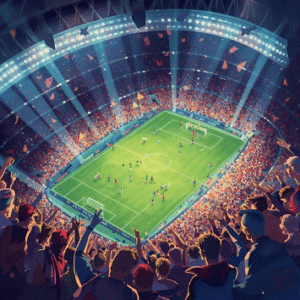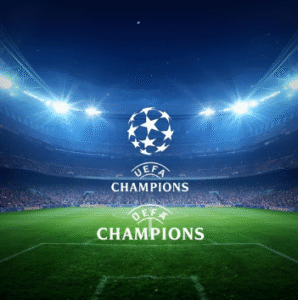Introduction to the UEFA Champions League 2025
The UEFA Champions League 2025 is set to capture the attention of soccer fans across the globe, bringing together elite clubs from Europe in a competition that consistently delivers top-tier action. As the tournament approaches, excitement continues to build around the high-level performances, tactical battles, and unforgettable goals that have become hallmarks of this event.
This year’s edition will spotlight both established giants and emerging teams aiming to cement their place among Europe’s best. Clubs are entering the competition after strengthening their squads during the transfer window, making the level of competition fiercer than ever. With players in peak form and managers crafting strategies to outwit their opponents, the 2025 season is shaping up to deliver a blend of drama, skill, and unpredictability.

Fans can also look forward to the electric atmosphere that defines matches in this competition. Stadiums across the continent will be packed with passionate supporters, creating unforgettable environments that enhance the experience for both players and viewers. From the anthems echoing across the arenas to the last-minute goals that change the course of matches, every moment promises to contribute to the tournament’s legacy.
Format and Structure
The UEFA Champions League follows a well-established structure designed to maximize competition and excitement. For the 2025 season, the tournament begins with 32 teams divided into eight groups of four. Each team faces the others in their group twice, once at home and once away. These matchups create a dynamic stage where clubs battle for the top two spots in their group, which are required to progress to the next phase.
Once the group stage concludes, the competition moves into its high-stakes knockout rounds. The Round of 16 features two-legged matchups, where teams play one home and one away game. Aggregate goals determine which side advances, with away goals no longer serving as a tiebreaker under the current rules. This format extends through the quarterfinals and semifinals, ensuring every matchup tests the skill, strategy, and resilience of the competing clubs.

The final stands as the only single-match fixture of the tournament, hosted at a pre-selected venue that adds unique character to the event. The anticipation surrounding the final is unmatched, as teams vie for the chance to lift the coveted trophy in front of tens of thousands of fans in attendance and millions watching worldwide.
Teams to Watch
The UEFA Champions League 2025 features a captivating lineup of clubs ready to showcase their talent on the biggest stage in European soccer. With Manchester City entering the tournament as reigning champions, all eyes are on their squad, which continues to deliver dominant performances under Pep Guardiola. Their ability to control games and execute precise attacks makes them a formidable opponent for any team.
Real Madrid, synonymous with success in this competition, brings both experience and ambition. Their deep squad and knack for rising to the occasion in critical moments ensure they remain a top contender. Bayern Munich also arrives with high expectations, combining seasoned players with emerging stars to maintain their competitive edge.
Paris Saint-Germain, with a roster filled with global superstars, has bolstered their squad in pursuit of their first Champions League title. Their attacking firepower makes them a threat to any defense. On the other hand, Barcelona is building momentum, with young players stepping into leadership roles and contributing to the club’s evolving identity.

The 2025 edition also highlights clubs with growing potential. Teams like Inter Milan and Arsenal, with well-balanced rosters and strong coaching, aim to challenge Europe’s traditional powerhouses. The inclusion of clubs representing smaller leagues provides a chance for surprises, as these teams often bring unique styles of play that disrupt the strategies of more established sides.
Player performances will also be in the spotlight, with standout talents capable of influencing outcomes. Established stars like Erling Haaland and Kylian Mbappe are expected to deliver game-changing moments, while others will be eager to prove themselves on this grand platform. These individual battles and displays of skill will undoubtedly add to the excitement of the tournament.
Significant Matches and Rivalries
The UEFA Champions League 2025 promises to feature unforgettable matchups that will captivate fans and bring out the competitive spirit in clubs across Europe. One of the standout games in the group stage will be Bayern Munich facing off against Barcelona, two clubs with rich histories and legacies in this competition. The tactical approach of these teams, paired with the individual brilliance of their players, is set to create a spectacle of soccer at its finest.
Another highly anticipated encounter involves Paris Saint-Germain, whose offensive strength makes every match an edge-of-the-seat experience, going up against another European heavyweight. These games are sure to push both sides to their limits, testing their strategies and resilience. Additionally, Arsenal’s potential clash with a title favorite provides an opportunity for the London club to demonstrate their ambition and ability to compete with Europe’s elite.

Knockout rounds often amplify the intensity, and the 2025 tournament will likely be no different. Rivalries that have developed over previous seasons may be reignited, such as the potential meeting of Real Madrid and Manchester City. These contests not only highlight tactical brilliance but also showcase moments of individual brilliance under pressure.
Matches featuring underdog teams who have managed to progress into the knockout stages often bring added intrigue. These clubs, driven by determination and unique styles of play, are capable of delivering surprising results that shake up expectations.
Broadcasting and How to Watch
Fans will have numerous options to follow the 2025 UEFA Champions League, ensuring access to every thrilling moment of the competition. Viewers in the United States can enjoy live coverage through CBS Sports, which also provides streaming access via Paramount+. These platforms guarantee high-quality broadcasts, offering fans multiple ways to stay connected to the action.
In Europe, major broadcasters like BT Sport, Sky Sports, and Canal+ will cover the tournament, catering to regional audiences with live games, expert analysis, and in-depth pre- and post-match content. Streaming services are also widely available, giving fans flexibility in how and where they watch. Platforms like DAZN offer comprehensive access in various countries, providing live matches, highlights, and exclusive interviews.
For fans seeking additional coverage, UEFA’s official website and UEFA.tv serve as excellent resources. UEFA.tv offers match highlights, behind-the-scenes content, and special features that provide deeper insights into the tournament’s key moments. This service is particularly helpful for catching up on games or reliving pivotal plays.
The growing popularity of mobile viewing has also led to a range of apps dedicated to live soccer coverage. Many broadcasters, including CBS Sports and BT Sport, offer mobile-friendly options, making it easier than ever for fans to watch games on the go. With seamless streaming across multiple devices, these apps enhance the accessibility of the tournament, ensuring fans don’t miss a single play.

Beyond traditional broadcasts, social media platforms are expected to play a significant role in delivering real-time updates and highlights. Official UEFA Champions League accounts across platforms like Twitter, Instagram, and YouTube will keep fans informed with updates, interviews, and clips from standout performances. These channels allow fans to engage directly with the competition, fostering a sense of community among supporters worldwide.
For those who prefer watching games in group settings, sports bars and fan hubs will be hosting live viewings throughout the tournament. These spaces often amplify the excitement, creating an energetic atmosphere for fans to enjoy matches together. Many official fan clubs also organize viewing parties, particularly for the knockout stages and final, making it a social event as much as a sporting spectacle.
Impact on European and World Soccer
The UEFA Champions League has long been a competition that influences soccer beyond the boundaries of Europe, shaping the sport in profound ways. As one of the most prestigious tournaments in the world, it plays a key role in elevating the profile of clubs, players, and even national leagues. Success in this competition often translates into greater financial opportunities for clubs, allowing them to invest in infrastructure, youth academies, and player acquisitions. This ripple effect enhances the overall standard of soccer in Europe and beyond.
One of the most significant contributions of the Champions League is its ability to showcase diverse playing styles. Teams from different leagues bring unique tactical approaches to the tournament, leading to matchups that challenge traditional ways of thinking about the game. The exposure to varying systems, from high-intensity pressing to patient, possession-based strategies, encourages innovation and adaptability, both of which influence domestic leagues and international competitions. Coaches and analysts study these matches extensively, often adopting successful tactics into their own setups.
Additionally, the tournament creates a global stage for clubs to build their brands and reach international audiences. Clubs with strong performances in the Champions League gain heightened visibility, expanding their fan bases in regions far from their home countries. This increased attention not only boosts merchandise sales and sponsorship deals but also strengthens the cultural impact of soccer in emerging markets. The Champions League has been instrumental in popularizing the sport in countries where soccer is growing in prominence, helping it compete with more established sports.

The competition also has a significant impact on the careers of individual players. For many, the Champions League is the ultimate opportunity to prove their skills against the best in the world. Exceptional performances often lead to increased recognition, endorsements, and transfer interest from other clubs. Young players, in particular, use the tournament to announce themselves on the global stage, catching the eye of scouts, managers, and fans alike. The exposure accelerates their development, as competing in high-pressure environments against elite opponents forces them to improve their technical and mental capabilities.
On a broader scale, the Champions League contributes to fostering connections between clubs and nations. As players from different countries come together to compete for club teams, they bring elements of their own cultures and experiences. This mix enhances the dynamics of the teams and highlights the increasingly global nature of soccer. The tournament also provides opportunities for smaller clubs and less dominant leagues to gain recognition, especially when they achieve unexpected victories or progress deep into the competition. These moments underscore the universal appeal of the sport and remind fans why soccer is often referred to as “the beautiful game.”
Moreover, the financial rewards associated with participation and success in the Champions League are transformative for clubs. For smaller clubs, even qualifying for the group stage can lead to substantial income that can be reinvested into the squad, training facilities, or youth programs. For larger clubs, advancing to the later stages solidifies their financial stability, enabling them to remain competitive in transfer markets and maintain top-tier squads. The financial boost trickles down into domestic leagues as well, raising overall competitiveness and improving the quality of soccer at all levels.

Broadcasting the Champions League further amplifies its influence, as millions of fans worldwide tune in to watch the action. The accessibility of matches through streaming platforms and television ensures that soccer enthusiasts across the globe are exposed to the high level of play that the competition demands. This exposure fuels interest in the sport, inspiring young athletes to aspire to one day play on this stage. In turn, it helps develop the next generation of soccer talent, not just in Europe but in every corner of the world.
As the 2025 edition unfolds, the ripple effects of the tournament will continue to shape the global soccer landscape. From setting tactical trends to creating lifelong memories for players and fans, the UEFA Champions League remains a driving force in the evolution of the sport. Its ability to connect people through a shared love of soccer reinforces its status as much more than a competition—it is a celebration of the game itself.


